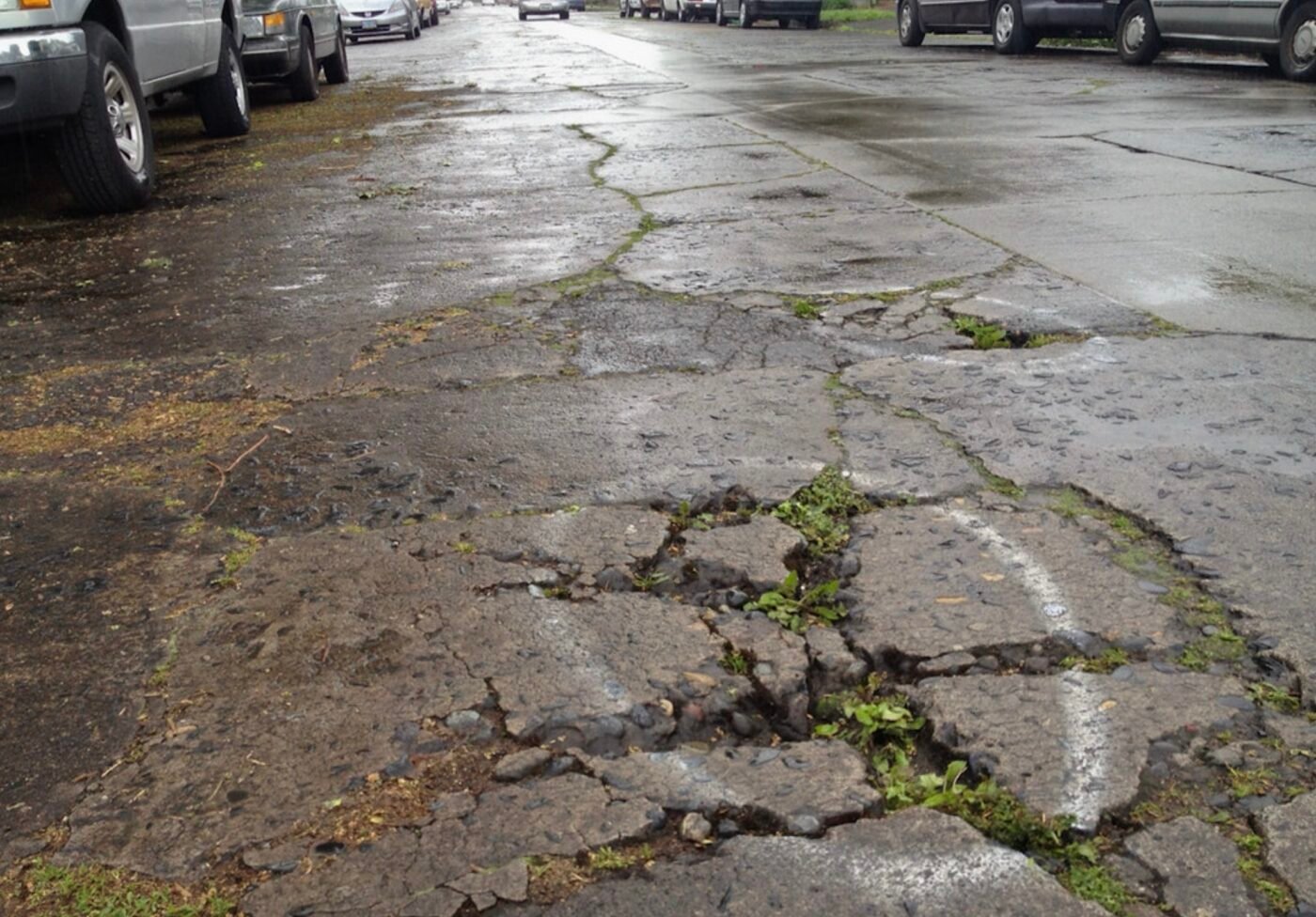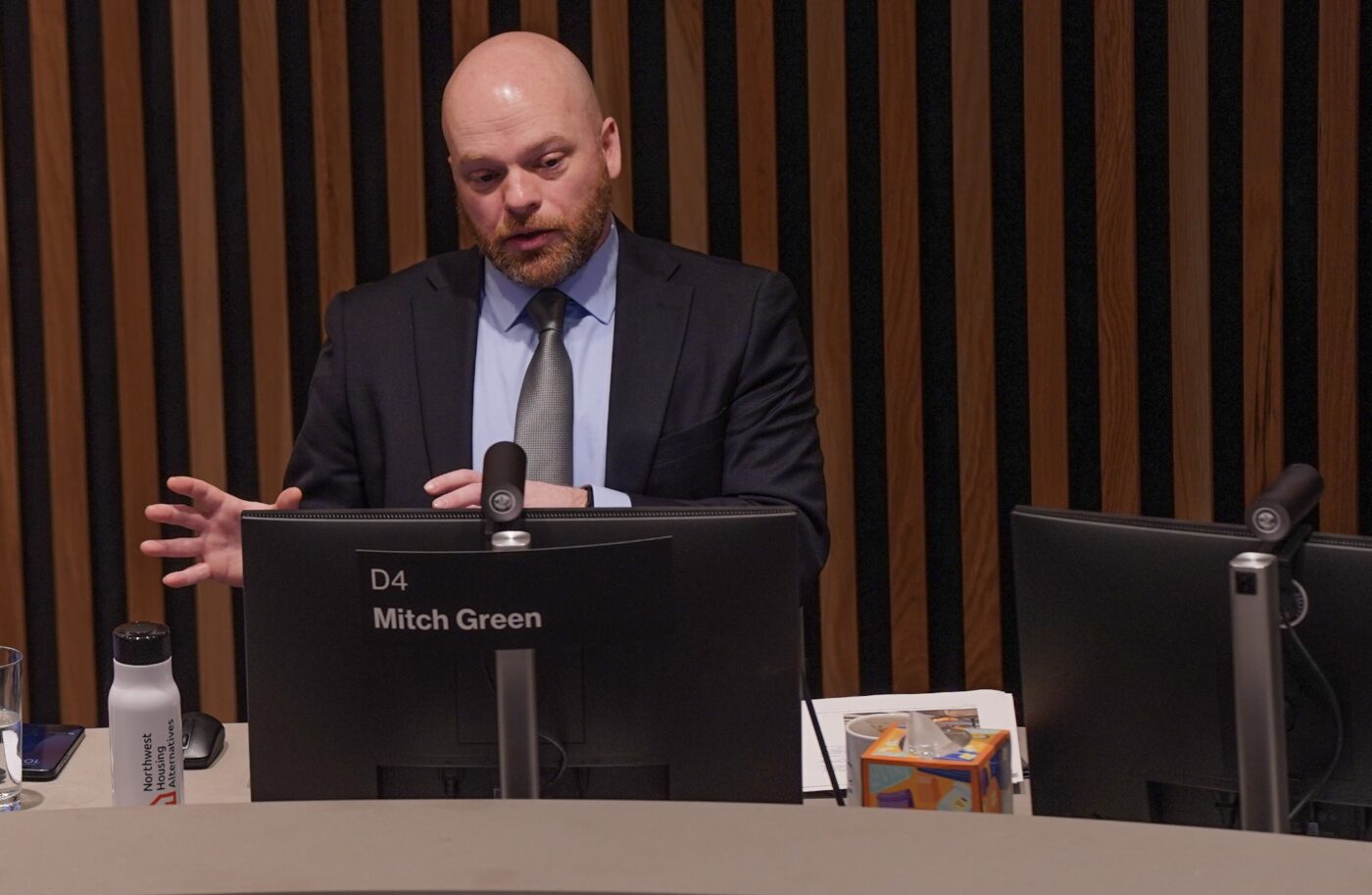“You should… take some streets out of service.”
– Mitch Green, Portland city councilor
Portlanders have heard for years that our transportation agency cannot keep pace with required road maintenance. As our pavement buckles under the pressure of an ever-increasing number of cars, no one wants to pony-up the funding it takes to keep roads smooth and safe. Something’s gotta’ give.
What if instead of playing catch-up, we reduced the amount of lane miles we maintained, thereby lowering the city’s overall financial burden? That’s an idea I’ve heard in activist circles for years, but closing streets to motor vehicle access to save on maintenance costs had always seemed like a fringe notion. Today it was thrust closer toward the mainstream by a Portland city councilor named Mitch Green.
Speaking at a meeting of the city’s Transportation and Infrastructure Committee this morning after a presentation on what Green called the “dire” financial state of the Portland Bureau of Transportation, Councilor Green said, “Every mile of road is a liability in terms of unfunded, ongoing operations and maintenance, which will then be always costlier in the future.” Then, speaking directly to PBOT Director Millicent Williams and Deputy City Administrator of Public Works Priya Dhanapal, Green continued:
“You should work with and have some conversations with the Bureau of Planning and Sustainability and talk about opportunities to take some streets out of service. Turn them into superblocks, turn them into cul-de-sacs, turn them into plazas… Community gardens even. Because if we do that, I think we can lower our expenses over time. I think we can create more buildable land, create more housing density, which will then allow us to have a transit and active transportation-forward city, which is always going to be less costly than continuing to rely upon vehicular lane mileage.”
Surprisingly, PBOT Director Williams said her agency is already considering the idea. “Our planning team is actively engaging in that conversation,” she replied. “There are a number of projects that are underway that speak specifically to what you’ve outlined.”
I’m still working to get more details from both Green and PBOT (to clarify what exactly Director Williams was referring to), but it’s worth noting Green’s inspiration. Before being elected to city council in November, he was an energy economist for the Bonneville Power Administration and previously taught economics at Portland State University. He also believes addressing climate change is, “the most pressing issue of our time.” It’s the twin emergencies of PBOT’s fiscal cliff and the very real impacts of climate change that are behind Green’s comments.
Councilor Green, a Democratic Socialist, is also an avid BikePortland reader who very well might have perused our recent guest opinion from Sam Balto that advocated for creating more cul-de-sacs throughout Portland as a way to improve quality of life.
Either way, given that PBOT is on the ropes in the fight for a balanced budget, it’s the perfect time for bold, out of the box thinking. And if you consider that PBOT already has mature street plaza, neighborhood greenway, and road diet (or what they call “lane reconfiguration”) programs; decommissioning even more lane miles in order to reduce financial liability and get closer to climate and transportation goals doesn’t really seem all that fringe anymore. (Also worth noting that PBOT has a lot of experience in this realm, like when they’ve partnered with folks to create “play streets.”)
The PBOT 2025-2026 budget proposal is expected to be released at the end of this week. The Transportation & Infrastructure Committee will then make a recommendation to the finance committee. There are more conversations to be had before Councilor Green’s idea is one of them, but at least the conversation has begun.
UPDATE, 4:30 pm: PBOT Communications Director Hannah Schafer has clarified their position on Councilor Green’s comments:
“Because we are investing so little in the maintenance of our streets right now, this wouldn’t actually create any significant cost savings, but it would reduce our risk and potentially add a small amount of savings to our overall $6B in deferred maintenance.
Today, we approach this work through the reallocation of lane space – i.e. changing the way we use our existing roadway space by allocating more pavement from heavy vehicles to less heavy uses such as bikes that will impact our assets less over time. Our street plazas are another example of reallocating pavement for public use. We are also partnering with organizations like Depave to transform lane miles to places through co-investment with adjacent businesses and community, but that is not representing any significant savings at this time (though there are certainly other important benefits!).”
In related news, tonight (Monday, 2/24) is the Streets of Possibility: Well Beyond Cars event hosted by the PDX Design Collaborative as part of their City of Possibility event series. More info here.




